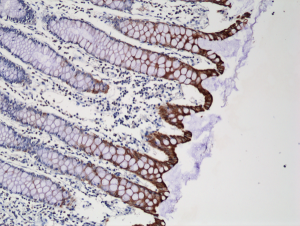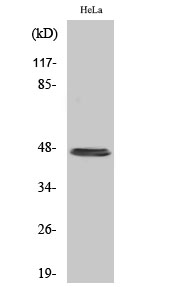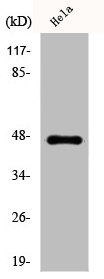
Immunohistochemical staining of formalin fixed and paraffin embedded human colon tissue sections using Anti-CK20 Rabbit Monoclonal Antibody (Clone RM283) at a 1:250 dilution.
anti-Cytokeratin-20 (human), Rabbit Monoclonal (RM283)
REV-31-1166-00
ApplicationsWestern Blot, ImmunoHistoChemistry
Product group Antibodies
ReactivityHuman
TargetKRT20
Overview
- SupplierRevMAb Biosciences
- Product Nameanti-Cytokeratin-20 (human), Rabbit Monoclonal (RM283)
- Delivery Days Customer2
- ApplicationsWestern Blot, ImmunoHistoChemistry
- CertificationResearch Use Only
- ClonalityMonoclonal
- Clone IDRM283
- Gene ID54474
- Target nameKRT20
- Target descriptionkeratin 20
- Target synonymsCD20, CK-20, CK20, K20, KRT21, keratin, type I cytoskeletal 20, cytokeratin 20, keratin 20, type I, protein IT
- HostRabbit
- IsotypeIgG
- Protein IDP35900
- Protein NameKeratin, type I cytoskeletal 20
- Scientific DescriptionCytokeratins are keratin proteins found in the intracytoplasmic cytoskeleton of epithelial tissue (at least 20 different polypeptides). They are an important component of intermediate filaments, which help cells resist mechanical stress. Expression of these cytokeratins within epithelial cells is largely specific to particular organs or tissues. The subsets of cytokeratins which an epithelial cell expresses depends mainly on the type of epithelium, the moment in the course of terminal differentiation and the stage of development. Thus a specific cytokeratin expression profile allows the identification of epithelial cells. Furthermore, this applies also to the malignant counterparts of the epithelia, (carcinomas). Cytokeratin subtype expression patterns are used to an increasing extent in the distinction of different types of epithelial malignancies. The cytokeratin antibodies are not only of assistance in the differential diagnosis of tumors using immunohistochemistry on tissue sections, but are also a useful tool in cytopathology and flow cytometric assays. Cytokeratin-20 (CK20) is a type I cytokeratin. It is a major cellular protein of mature enterocytes and goblet cells and is specifically found in the gastric and intestinal mucosa. Cytokeratin-20 is a useful marker of pancreatic and colorectal cancer. Cytokeratin-20 is also helpful in distinguishing different types of highly related carcinomas, such as renal oncocytomas from renal cell carcinomas. It is often used in combination with antibodies to Cytokeratin-7 (CK7) to distinguish different types of glandular tumour. - Recombinant Antibody. This antibody reacts to human CK20 (Cytokeratin-20). Applications: WB, IHC. Source: Rabbit. Liquid. 50% Glycerol/PBS with 1% BSA and 0.09% sodium azide. Cytokeratins are keratin proteins found in the intracytoplasmic cytoskeleton of epithelial tissue (at least 20 different polypeptides). They are an important component of intermediate filaments, which help cells resist mechanical stress. Expression of these cytokeratins within epithelial cells is largely specific to particular organs or tissues. The subsets of cytokeratins which an epithelial cell expresses depends mainly on the type of epithelium, the moment in the course of terminal differentiation and the stage of development. Thus a specific cytokeratin expression profile allows the identification of epithelial cells. Furthermore, this applies also to the malignant counterparts of the epithelia, (carcinomas). Cytokeratin subtype expression patterns are used to an increasing extent in the distinction of different types of epithelial malignancies. The cytokeratin antibodies are not only of assistance in the differential diagnosis of tumors using immunohistochemistry on tissue sections, but are also a useful tool in cytopathology and flow cytometric assays. Cytokeratin-20 (CK20) is a type I cytokeratin. It is a major cellular protein of mature enterocytes and goblet cells and is specifically found in the gastric and intestinal mucosa. Cytokeratin-20 is a useful marker of pancreatic and colorectal cancer. Cytokeratin-20 is also helpful in distinguishing different types of highly related carcinomas, such as renal oncocytomas from renal cell carcinomas. It is often used in combination with antibodies to Cytokeratin-7 (CK7) to distinguish different types of glandular tumour.
- ReactivityHuman
- Storage Instruction-20°C,2°C to 8°C
- UNSPSC41116161








